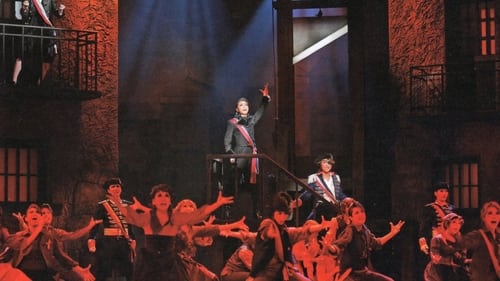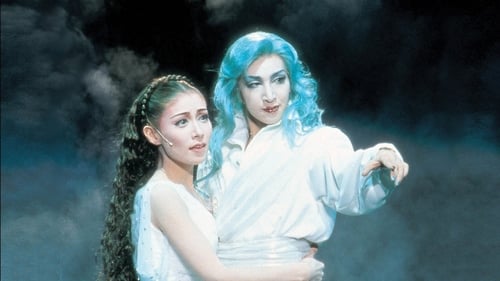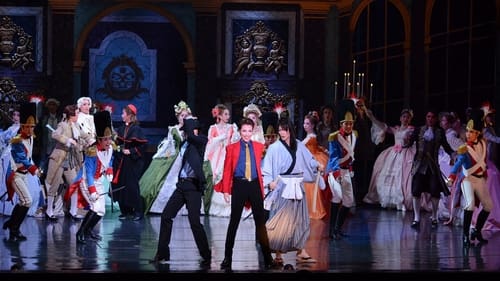Elisabeth: The Rondo of Love & Death (2005)
Gênero : História
Runtime : 0M
Director : Koike Shuuichirou
Sinopse
Takarazuka Moon Troupe 2005 production of the Viennese musical Elisabeth.

Takarazuka Revue's Phantom based on the play by Maury Yeston and Arthur Kopit.

2014 Takarazuka Revue Star Troupe production. This is the story of a hero, a man who rescued France from the chaos of revolution. His name was Napoléon Bonaparte. Having climbed to unparalleled heights after conquering Europe and becoming the first Emperor in the history of France, what was this hero seeking? Whom did he love? The truth behind this man who led such a turbulent life is about to unfold.

The critically acclaimed all-woman Japanese acting revue Takarazuka brings Rurouni Kenshin to life, creating a new twist on a globally loved story.

Based on the Waki Yamato's manga version of The Tale of Genji. An all-female production starring members of the Takarazuka Revue.

The musical tells the story of Elisabeth ("Sisi"), the Empress of Austria, from her engagement and marriage in 1854 to her murder in 1898 at the hands of the Italian anarchist Luigi Lucheni, through the lens of her growing obsession with death, as her marriage and her empire crumble around her at the turn of the century.

France at the end of the 18th century—after several years from the French Revolution, in which the downtrodden common men and women rose up for freedom and sent many a noble to the guillotines of the Revolutionary Government. English aristocrat Sir Percival Blakeney [Percy] (Yuzuru Kurenai), opposed to the reign of terror, was hiding his true identity to assist falsely arrested nobles flee France, calling himself the “Scarlet Pimpernel,” after a star-shaped red flower in England. Chauvelin (Makoto Rei), the chief agent of the Committee of Public Safety of the Revolutionary Government, was hunting for the Scarlet Pimpernel to reveal his identity. Book and Lyrics by Nan Knighton Music by Frank Wildhorn Based on the Novel “The Scarlet Pimpernel” by Baroness Orczy Original Broadway Production Produced by Radio City Entertainment and Ted Forstmann With Pierre Cossette, Bill Haber, Hallmark Entertainment and Kathleen Raitt Adaptation and direction by Shuichiro Koike

It is 17th-century France, where Louis XIV, the "Sun King," reigns. The Musketeers, who answer to the king, diligently train themselves day in and day out to protect their liege and the state. Each of these highly skilled warriors also has a unique personality: Porthos is courageous and daring, Athos is calm and reassuring, Aramis is a ladies' man like none other in his time, while d'Artagnan is our invincible hero. All, meanwhile, are utterly proud and brave warriors.

Based on Austrian musical Elisabeth. Flower Troupe 2014.

In the midst of Sweden's rise to power, King Gustav III was the "darling of the rococo" who brought to flower the gorgeous Nordic culture. Set in the turbulent 18th century Europe, where power and intrigue swirled around him, this musical depicts his love, friendship, and courageous battle for his beliefs on a grand scale, involving a variety of characters.

Set on the fictional Mediterranean island of Callista on the eve of the outbreak of the French Revolution, the play depicts the struggles of a young officer who is torn between love, friendship, and his love for his homeland.

Alucard, a vampire resurrected in present-day New York, has achieved a “degenerative evolution” over the past 700 years. He no longer attacks people for blood, and is no longer afraid of crosses. He spends his days with his friend, Helsing XVI, a descendant of vampire researchers. Acting as Helsing’s ghost writer, he writes a fantasy romance novel about the events he witnessed in his past. One day, Alucard is dressed as a “vampire” at a Halloween costume party celebrating the publication of his book. There, he meets Lucy, a university student who dreams of becoming a dentist. As he gradually becomes more attracted to Lucy, his desire to become human grows. For a vampire with the gift of immortality, it is the equivalent of suicide.

A collaboration between Capcom Japan and the Takarazuka Revue

The franchise centers on "Starlight," a dance and dance troupe beloved the world over. Karen and Hikari promised each other when they were little that one day they would perform together on that stage. Time passes and now they are both 16 years old. Karen is very excited about the dance lessons she takes every day, keeping her promise close to her heart. Hikari changed schools and now lives far away from Karen. But the gears of fate bring them together again, destined to meet again. The two, along with other hopefuls, will compete in a mysterious audition to become part of this great company.

Takarazuka Revue's 2002 production of the Viennese musical Elisabeth. It portrays the life and death of Empress Elisabeth of Austria, wife of Emperor Franz Joseph I. This was the 4th production of Elisabeth for Takarazuka Revue and first for the Flower Troupe.

Based on the manga The Rose of Versailles by Ikeda Riyoko.

Na França moderna, uma exposição está sendo realizada no Palácio de Versalhes do "Colar de Maria Antonieta". O colar havia sido usado em um caso de fraude que marcou um capítulo na história da França e depois desapareceu. Foi reproduzido com diamantes verdadeiros. Fujiko se esgueirou para Versalhes, assim como a gangue de Lupin, Goemon e Jigen - todos com a intenção de colocar as mãos no colar, que está avaliado em mais de 3 bilhões de ienes em dinheiro hoje. Mas eles esbarram no Inspetor Zenigata. Lupin é quem consegue frustrar Zenigata e pegar o colar. No entanto, no instante em que ele coloca as mãos sobre ele, todos são envolvidos por uma luz misteriosa. Quando eles recuperam a consciência, eles percebem que passaram por um lapso de tempo até 1785, antes da Revolução Francesa, quando Luís XVI e Maria Antonieta estavam por perto.

Set in the 1920s, Nice Work If You Can Get It is the story of charming and wealthy playboy Jimmy Winter, who meets rough female bootlegger Billie Bendix the weekend of his wedding. Jimmy, who has been married three (or is it four?) times before, is preparing to marry Eileen Evergreen, a self-obsessed modern dancer. Thinking Jimmy and Eileen will be out of town, Billie and her gang hide cases of alcohol the basement of Jimmy’s Long Island mansion. But when Jimmy, his wife-to-be and her prohibitionist family show up at the mansion for the wedding, Billie and her cohorts pose as servants, causing hijinks galore.

The time: the 1920s. The place: New York City. The Lower East Side, on the southeast corner of Manhattan Island, is home to a great many Jewish immigrants who came to the United States, beginning in the late 19th century, from a Russia ravaged by political turmoil and an eastern Europe where they had experienced tremendous poverty. Despite the American dream that anyone can achieve success, for the Jewish immigrants in the Lower East Side this dream is difficult to make a reality. David “Noodles” Aaronson is born into this Jewish enclave, and from a very young age gets his hands dirty in the seedy underbelly of society. Along with his trusted companions Max, Cockeye, Patsy, and Dominic, Noodles lays down roots in the criminal underworld...

Takarazuka Revue’s 2007 production of the Viennese musical Elisabeth. The musical tells the story of Elisabeth (“Sisi”), the Empress of Austria, from her engagement and marriage in 1854 to her murder in 1898 at the hands of the Italian anarchist Luigi Lucheni, through the lens of her growing obsession with death, as her marriage and her empire crumble around her at the turn of the century.

The War of the Roses (1455-1485), a turning point in the history of England, where the Lancasters and the House of York divided the domestic princes and knights between them in a power struggle. Henry Tudor (later Henry VII), a Lancaster through his mother's line, finally wins. This begins the Tudor dynasty and lays the foundation for modern England. Henry VII, who lived between the times of Richard III and Henry VIII, has been regarded as a mysterious person. As a member of the Lancaster family (the red roses), he was drawn into conflict with Edward IV and Richard III of the York family (the white roses). This work depicts a man thinking of his mother and the expectations of his friends throughout his life, as he aimed for peace in England and the throne.















